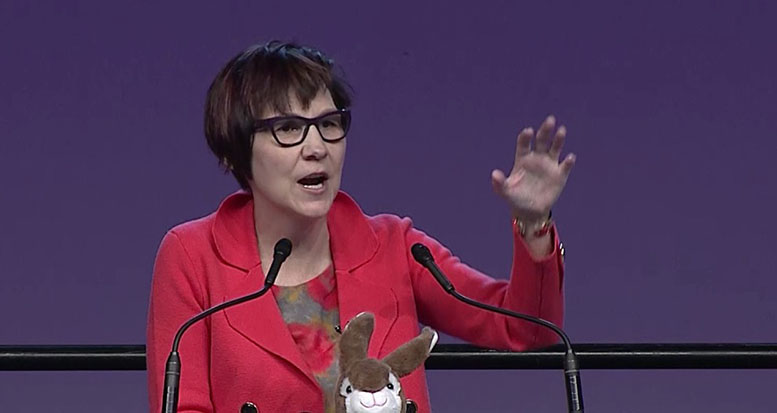By Jeremy Appel, Local Journalism Initiative Reporter
(ANNews) – First Nations leaders from across Canada voted down a $47.8-billion child welfare settlement with the federal government at an Assembly of First Nations (AFN) special chiefs assembly on Treaty 7 territory.
The special meeting, which occurred from Oct. 16 to 18 in Calgary, focused on a draft agreement AFN leadership, Chiefs of Ontario and Nishnawbe Aski Nation reached with the federal government in July focused on long-term reform of the First Nations Child and Family Services (FNCFS) program.
On Oct. 17, the assembly’s second day, 267 out of 414 chiefs, or 64 per cent, voted against finalizing the agreement with the feds.
The following day, delegates in attendance overwhelmingly voted to overhaul the negotiations process, with 186 votes in favour, seven opposed and 10 abstentions.
The agreement was designed to address what the Canadian Human Rights Tribunal (CHRT) found in 2016 to be Canada’s discrimination against First Nations families and children by systematically defunding the on-reserve child welfare system.
The CHRT tasked the feds with reaching a $40,000-per-child compensation agreement with First Nations, as well as an agreement towards long-term reform of the First Nations child welfare system to assure decades of discrimination doesn’t repeat itself.
AFN National Chief Cindy Woodhouse Nepinak, who was elected at a special chiefs assembly last year, urged delegates to vote in favour of the draft agreement in her Oct. 16 opening remarks, emphasizing that the agreement is just a “starting point” towards revitalized First Nations self-governance.
“For generations, provincial and federal governments imposed colonial laws to redefine us. Now we can define ourselves,” said Woodhouse Nepinak.
“We have secured the money, we’ve negotiated control. Now it’s your choice.”
The national chief cautioned that there’s no guarantee First Nations will get a better deal if they turn down the draft agreement, given “Canada’s current political reality.”
“Time is running out on this government. You don’t have to be a political scientist to figure out that there’s a good chance we will be dealing with a different government sooner than later,” Woodhouse Nepinak noted.
“And based on that history that we know, can we count on a Conservative government to negotiate a better deal on First Nations child welfare?”
Cindy Blackstock of the First Nations Family and Child Caring Society was one of the leading voices opposed to the agreement.
The Caring Society, as it’s otherwise known, took the federal government to the CHRT alongside the AFN, but played no role in negotiating the settlement agreement.
Acknowledging in her Oct. 16 remarks to the assembly that $47.8 billion “is a very large number,” Blackstock noted some “fine print” in the agreement that called its ability to deliver on its promises into question.
Section 383 of the agreement notes that all of the funding commitments outlined in the agreement “remain subject to annual appropriation by the Parliament of Canada, or other necessary approval processes required by the Government of Canada.”
In practice, Blackstock said, this means that the AFN is being asked to vote on a “one-year funding agreement with a lot of discretion from Canada after that.”
The “other necessary approval processes” mentioned in the agreement, Blackstock added, are “undefined” and “arbitrary,” which she suggested could be prone to abuse.
Even if the agreement did provide consistent funding for its 10-year duration, other critics questioned what would happen if discrimination persists after a decade.
Additional concerns were raised about the AFN’s “overly dominant role” in implementing the agreement, which Squamish Nation said came at the expense of regional representation.
These shortcomings would have undermined the ability of First Nations to exercise meaningful control over services affecting our children,” Squamish Nation said in an Oct. 18 statement.
Another criticism was that the agreement only applies to First Nations people who went through the on-reserve child welfare system.
Natalie Starlight Fraser, a youth and social worker from Siksika Nation, told delegates how she was taken off reserve when she was three and placed into foster care. Once she aged out of the system at 18, she went “straight to the homeless shelter.”
Since she was off reserve, Fraser received support from the provincial government, which ended when she turned 22.
“I need chiefs to step up for off-reserve youth, because they deserve justice and healing no matter where they are located,” said Fraser.
“Reserves are a colonial concept. This is our land. These are our kids, and not being on reserve does not dictate their worthiness. It is not their fault they are in the Alberta system.”
Mary Teegee, chair of the Our Children Our Way Society, which represents 25 First Nations child and family service providers in British Columbia, was pleased to see the agreement voted down.
“Today is a day of dreams,” she said in an Oct. 18 statement. “We came together to get the best solutions for our children—solutions rooted in love and justice. Our work here honours all those children we have lost and carries hope for a new generation who will not suffer from Canada’s discrimination.”
In an Oct. 17 statement, the leadership of Nishnawbe Aski Nation, which negotiated the draft agreement alongside the AFN and Chiefs of Ontario, said it was “disappointed” in the outcome of that day’s vote but respected the will of the majority.
However, the statement said it was “shameful” to see delegates applaud as the agreement was voted down, accusing many of those who celebrated of “being those in the child welfare agencies who will continue to benefit from the status quo.”
“Instead of moving forward together in a strength-based approach, we saw the divisiveness that unfortunately just continues to cause harm to our children,” it read.



Be the first to comment on "First Nations chiefs reject 10-year, $47.8-billion child welfare agreement"